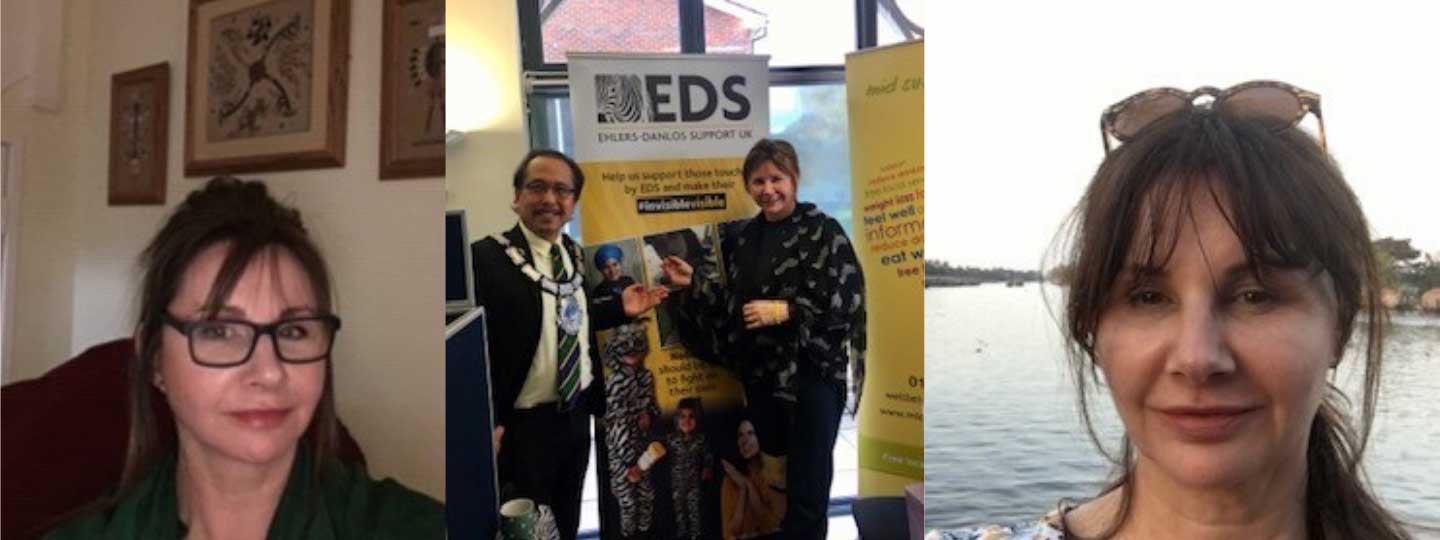Living with Ehlers-Danlos syndrome: Jane’s story
28 May 2020
Jane has lived with hypermobility Ehlers-Danlos syndromes (hEDS) and associated conditions since birth. Previously a qualified, professional autism educationalist and now a ‘sandwich’ carer for her eldest adult child and elderly mother. Jane is passionate about raising awareness of her condition in the hope that there will be a clear diagnostic care pathway in the future.
Ehlers-Danlos syndromes and the closely related Hypermobility Spectrum disorder (HSD) are multi-systemic heritable connective tissue disorders. Connective tissue is the glue like substance that is in all parts of our body. In people with EDS/HSD the connective tissue is defective.
Here she shares her story.
Can you tell us how you were diagnosed?
Since birth, I experienced a range of painful symptoms, from sprains, low blood pressure, joint dislocations, stomach cramps, dizziness, migraines, pain from fibromyalgia, sugar rushes, allergies and chronic fatigue. I would dislocate my shoulder simply from putting on a coat! Despite this, I was only told I was ‘bendy’, and I should avoid activities which exacerbated the pain. My hobbies as a child were sport and dancing, however I had to give them up as it made my symptoms much more severe.
As I got older, my symptoms have got worse, particularly after puberty and pregnancy. Despite two knee operations, disc prolapses, hip issues, increasing severe allergies, consultants and doctors didn’t have an answer for me.
It seemed like everywhere I turned I was being ignored and I became familiar with friends and doctors rolling their eyes or psychoanalysing me. Given that I also had a very late autistic diagnosis, I sometimes find it hard to express myself when anxious in these situations. I felt completely dismissed.
I was finally diagnosed with EDS3 (now hEDS) in 2015 after many years of being accused of ‘making up’ my symptoms.
How have you made changes in your life to help manage your condition?
Since that day I have learnt to take control of my symptoms. I bought a book on hypermobility and I am actively seeking out specialist practitioners across the UK. I know some limits, try to pace myself and look after my body/mind health.
I am passionate about equality and diversity which has made me a strong, passionate person who will not stop advocating for the rights of those with visible/invisible conditions.
What are the most challenging aspects of living with EDS?
1. Not being believed by colleagues, friends and medical practitioners – especially given that EDS can be a ‘hidden disability’.
2. Losing out on hobbies and missing events, such as my birthdays.
3. Having to cut short my professional career, money – taking an early retirement from my career was devastating and when I was working all my annual leave was spent at the doctors
4. The constant fear of flare ups, which can be very stressful.
What do you hope to achieve in the future?
I currently volunteer for Ehlers-Danlos Support UK, for SussexEDS (SEDS) community group and advocate on awareness and acceptance of the disorders in every way I can.
In the future, I hope that those who are experiencing typically ‘weird’ symptoms are believed by medical practitioners and that a clear diagnostic pathway is put in place for those who are diagnosed with EDS/HSD or are symptomatic.
What advice or tips would you give to someone who lives with EDS?
The best advice I could give to someone who suspects they have EDS/HSD would be that you are not alone or going crazy. It will be difficult to get a diagnosis, belief or support in the wider community, but there will be someone out there who understands.
That is why it is so important to be able to seek support in charities like Versus Arthritis and to other EDS/HSD charities such as Ehlers Danlos UK, who are there to signpost you in the right direction, listen and provide advice on how to manage your condition the best way you can!
We’re here whenever you need us.
If you’re feeling isolated from family and friends during these uncertain times, we’re here for you.
- If you would like to talk to someone, you can call our free helpline on 0800 5200 520 (Monday to Friday, 9am to 6pm)
- Join our online community
- Stay in touch and follow us on Twitter, Facebook and Instagram.
You might also be interested in...
-
"Working on projects and helping others, helps you focus on things other than pain."
Becci is 32 and lives with rheumatoid arthritis, fibromyalgia and hypermobility syndrome. She's found help in helping others and has created social media projects to break down stereotypes of what chronic illness ‘should’ look like.
-
"It’s reassuring to know that what you’re feeling isn’t something you’ve made up."
Rio is 28 and officially got her diagnosis of hypermobile EDS at the beginning of last year. We’ve spoken to her about her journey up to this point, what it’s like living with a condition not recognised by many people, and how she manages her symptoms and flare ups.